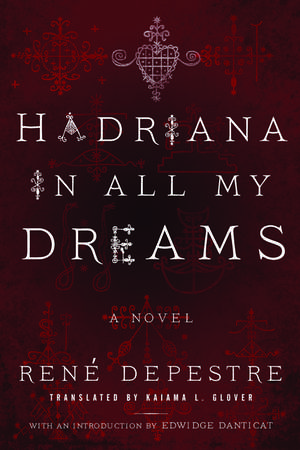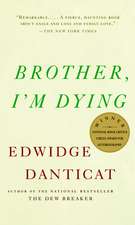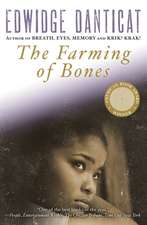Hadriana in All My Dreams
Autor René Depestre Cuvânt înainte de Edwidge Danticat Traducere de Kaiama L. Gloveren Limba Engleză Paperback – 2 mai 2017
"One-of-a-kind...[A] ribald, free-wheeling magical-realist novel, first published in 1988 and newly, engagingly translated by Glover...An icon of Haitian literature serves up a hotblooded, rib-ticking, warmhearted mélange of ghost story, cultural inquiry, folk art, and véritable l’amour."
--Kirkus Reviews, Starred review
"You’ve never read about a zombie like Hadriana. Transformed into the walking dead on her wedding day, Hadriana becomes part of popular legend, one imbued with magic, eroticism, and even humor."
--Tor.com
"You do not need to believe in zombies or Vodou to be carried away by this story—a metaphor for all forms of dispossession. . . . René Depestre has gone beyond nostalgia to write a sumptuous love story."
--Le Monde
With a foreword by Edwidge Danticat. Translated from the French by Kaiama L. Glover.
Hadriana in All My Dreams, winner of the prestigious Prix Renaudot, takes place primarily during Carnival in 1938 in the Haitian village of Jacmel. A beautiful young French woman, Hadriana, is about to marry a Haitian boy from a prominent family. But on the morning of the wedding, Hadriana drinks a mysterious potion and collapses at the altar. Transformed into a zombie, her wedding becomes her funeral. She is buried by the town, revived by an evil sorcerer, and then disappears into popular legend.
Set against a backdrop of magic and eroticism, and recounted with delirious humor, the novel raises universal questions about race and sexuality. The reader comes away enchanted by the marvelous reality of Haiti's Vodou culture and convinced of Depestre's lusty claim that all beings--even the undead ones--have a right to happiness and true love.
From the introduction by Edwidge Danticat:
Despestre offers us the kind of tale we rarely get in the hundreds of zombie stories featuring Haitians, stories set both inside and outside of Haiti. In Hadriana in All My Dreams we get both langaj--the secret language of Haitian Vodou--as well as the type of descriptive, elegiac, erotic, and satirical language, and the artistic license needed to create this most nuanced and powerful novel.
--Kirkus Reviews, Starred review
"You’ve never read about a zombie like Hadriana. Transformed into the walking dead on her wedding day, Hadriana becomes part of popular legend, one imbued with magic, eroticism, and even humor."
--Tor.com
"You do not need to believe in zombies or Vodou to be carried away by this story—a metaphor for all forms of dispossession. . . . René Depestre has gone beyond nostalgia to write a sumptuous love story."
--Le Monde
With a foreword by Edwidge Danticat. Translated from the French by Kaiama L. Glover.
Hadriana in All My Dreams, winner of the prestigious Prix Renaudot, takes place primarily during Carnival in 1938 in the Haitian village of Jacmel. A beautiful young French woman, Hadriana, is about to marry a Haitian boy from a prominent family. But on the morning of the wedding, Hadriana drinks a mysterious potion and collapses at the altar. Transformed into a zombie, her wedding becomes her funeral. She is buried by the town, revived by an evil sorcerer, and then disappears into popular legend.
Set against a backdrop of magic and eroticism, and recounted with delirious humor, the novel raises universal questions about race and sexuality. The reader comes away enchanted by the marvelous reality of Haiti's Vodou culture and convinced of Depestre's lusty claim that all beings--even the undead ones--have a right to happiness and true love.
From the introduction by Edwidge Danticat:
Despestre offers us the kind of tale we rarely get in the hundreds of zombie stories featuring Haitians, stories set both inside and outside of Haiti. In Hadriana in All My Dreams we get both langaj--the secret language of Haitian Vodou--as well as the type of descriptive, elegiac, erotic, and satirical language, and the artistic license needed to create this most nuanced and powerful novel.
| Toate formatele și edițiile | Preț | Express |
|---|---|---|
| Paperback (1) | 98.11 lei 3-5 săpt. | |
| AKASHIC BOOKS – 2 mai 2017 | 98.11 lei 3-5 săpt. | |
| Hardback (1) | 272.45 lei 3-5 săpt. | |
| Akashic Books, Ltd. – 18 iul 2017 | 272.45 lei 3-5 săpt. |
Preț: 98.11 lei
Nou
Puncte Express: 147
Preț estimativ în valută:
18.78€ • 19.53$ • 15.50£
18.78€ • 19.53$ • 15.50£
Carte disponibilă
Livrare economică 22 martie-05 aprilie
Preluare comenzi: 021 569.72.76
Specificații
ISBN-13: 9781617755330
ISBN-10: 1617755338
Pagini: 160
Dimensiuni: 133 x 210 mm
Greutate: 0.18 kg
Editura: AKASHIC BOOKS
Colecția Akashic Books
ISBN-10: 1617755338
Pagini: 160
Dimensiuni: 133 x 210 mm
Greutate: 0.18 kg
Editura: AKASHIC BOOKS
Colecția Akashic Books
Notă biografică
René Depestre (b.1926) is one of the most important voices of twentieth century world literature. His vast corpus includes works of poetry, prose fiction, literary criticism, and political essays. A peer of and collaborator with such seminal political and literary figures as Aimé Césaire, Jacques-Stephen Alexis, Pablo Neruda, Jorge Amado, and André Breton, Depestre has engaged with the politics and aesthetics of Negritude, social realism, and Surrealism, among other major twentieth century phenomena, over the course of a career that has spanned more than half a century. Having lived and written through significant moments in Haitian, New World, and Pan African history––from the overthrow of Haitian dictator Elie Lescot in 1946, to the first Pan African Congress in Paris 1956, to a struggle with Haiti’s François “Papa Doc” Duvalier in 1957, to collaboration with Cuban revolutionary Che Guevara and a fraught relationship with Fidel Castro in the 1960s and 70s––René Depestre is uniquely placed to reflect on the extent to which the entirety of the Americas and Europe are implicated in Haiti’s past and present reality.
Edwidge Danticat was born in Haiti and moved to the United States when she was twelve. She is the editor of Haiti Noir and Haiti Noir 2: The Classics, and author of several books, including Breath, Eyes, Memory, an Oprah Book Club selection, Krik? Krak!, a National Book Award finalist, The Farming of Bones, an American Book Award winner, and the novel-in-stories The Dew Breaker. She has also written several young adult novels and a travel narrative, After the Dance, A Walk Through Carnival in Jacmel. Her memoir, Brother, I’m Dying, was a 2007 finalist for the National Book Award and a 2008 winner of the National Book Critics Circle Award for autobiography. She is a 2009 recipient of the John D. and Catherine MacArthur Foundation grant and she lives in Miami.
Kaiama L. Glover is associate professor of French and Africana Studies at Barnard College, Columbia University. She is author of Haiti Unbound: A Spiralist Challenge to the Postcolonial Canon, coeditor of Marie Vieux Chauvet: Paradoxes of the Postcolonial Feminine, and translator of Frankétienne’s Ready to Burst. She has received awards from the National Endowment for the Humanities, the Mellon Foundation, and the Fulbright Foundation. Her translation of Marie Chauvet’s Dance on the Volcano is forthcoming. She is founding editor of sx archipelagos: a small axe journal of digital practice.
Edwidge Danticat was born in Haiti and moved to the United States when she was twelve. She is the editor of Haiti Noir and Haiti Noir 2: The Classics, and author of several books, including Breath, Eyes, Memory, an Oprah Book Club selection, Krik? Krak!, a National Book Award finalist, The Farming of Bones, an American Book Award winner, and the novel-in-stories The Dew Breaker. She has also written several young adult novels and a travel narrative, After the Dance, A Walk Through Carnival in Jacmel. Her memoir, Brother, I’m Dying, was a 2007 finalist for the National Book Award and a 2008 winner of the National Book Critics Circle Award for autobiography. She is a 2009 recipient of the John D. and Catherine MacArthur Foundation grant and she lives in Miami.
Kaiama L. Glover is associate professor of French and Africana Studies at Barnard College, Columbia University. She is author of Haiti Unbound: A Spiralist Challenge to the Postcolonial Canon, coeditor of Marie Vieux Chauvet: Paradoxes of the Postcolonial Feminine, and translator of Frankétienne’s Ready to Burst. She has received awards from the National Endowment for the Humanities, the Mellon Foundation, and the Fulbright Foundation. Her translation of Marie Chauvet’s Dance on the Volcano is forthcoming. She is founding editor of sx archipelagos: a small axe journal of digital practice.
Descriere
Legendary Haitian author Depestre combines magic, fantasy, eroticism, and delirious humor to explore universal questions of race and sexuality.













